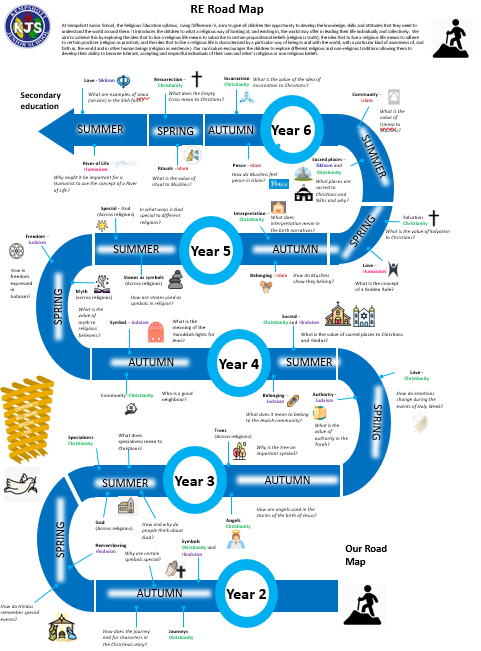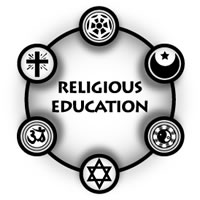RE
Subject leader - Mrs M. Rees
Subject Champions - Tinus J (yr3), Robyn J (yr4), William H (yr5),Arron J (yr6)
At Kempshott Junior School, we follow the Agreed Syllabus for religious education (RE) in Hampshire, the Isle of Wight, Portsmouth and Southampton: Living Difference IV.
We intend to ensure that all children are given the
We intend to introduce children to what a religious way of looking at, and existing in, the world may offer in leading their own life, individually and collectively.
We intend to ensure all children are given the opportunity to explore the idea that to live a religious life means to subscribe to certain propositional beliefs (religion is truth); the idea that to live a religious life means to adhere to certain practices (religion as practice); and the idea that to live a religious life is characterised by a particular way of being in and with the world, with a particular kind of awareness of, and faith in, the world and in other human beings (religion as existence.)
Our curriculum encourages the children to explore different religious and non-religious traditions allowing them to develop their ability to become tolerant, accepting and respectful individuals of their own and other’s religious or non-religious beliefs.
Implementation
Our RE Cycle of Enquiry follows five main steps:
Communicate where children and young people are introduced to the concept/word and invited to share their experiences in different ways.
Apply where the teacher opens up the classroom conversation so that children and young people can become aware of the experience of others, beginning with those in their class.
Enquire where children engage with the dimensions, manifestations, words and concepts of religious traditions and practices.
Contextualise where children explore the lived experience of what it means to live a life with a religious or other orientation through study of a tradition or other way of life that will include living examples or case studies where the material studied can be seen in real life context(s).
Evaluate where children begin to discern value either for those living within the context studied, or where children are brought to discern the question of how the material encountered and studied might matter in their own lives.
Across Key Stage 2, children will be introduced to key concept words alongside the Golden Thread concepts of community, belonging, special and love.
Year 3 focus on Cycles of Enquiry within Christianity and Judaism and focus on the Golden Threads of Love, Special and Belonging.
Year 4 focus on Cycles of Enquiry within Christianity and Judaism and focus on the Golden Threads of Community and Special.
Year 5 focus on Cycles of Enquiry within Islam, Christianity and Humanism and focus on the Golden Threads of Belonging, Love, Special and Community.
Year 6 focus on Cycles of Enquiry within Islam, Christianity, Sikhism and Humanism and focus on the Golden Thread of Love.
Impact
At Kempshott Junior School, we believe that the skills taught in RE can be transferred into other areas of children’s learning such as English, SMSC and Art, providing the children with life-long skills. The children build upon and develop these skills as they become more confident in exploring the RE concept.
The children will be assessed against the assessment opportunities referred to in each Medium Term Plan.
By the end of Year 3 and Year 4 children will have encountered, studied and had the opportunity to discern value in relation to four golden thread concepts/words of community, belonging, special, love, as well as other A concepts/words and some B concepts/words.
Children in Years 3 and 4 will be able to:
At Communicate … express creatively as well as describe their response to their own experiences of the concepts/words introduced. At Apply … recognise and describe how their responses relate to events in their own and sometimes other people’s lives.
At Enquire and Contextualise … accurately describe what has been taught about the meanings of concepts/words (taught at the Inquire step). … accurately describe some variations in ways in which the concept/word is shown in lives of people encountered and studied (taught at the Contextualise step).
At Evaluate … discern and describe the value of these concepts/words in the lives of those living in the traditions encountered and studied as well as recognising some of the issues this might raise. … discern possible value for their own lives and communities.
Children in Years 5 and 6 will be able to:
At Communicate … respond creatively as well as begin to explain their response to their own experiences of the concepts/words introduced. At Apply … explain some examples of how their responses relate to events in their own and other people’s lives. At Enquire and Contextualise … accurately explain meanings of concepts/words in the traditions encountered and studied (taught at the Inquire step).… accurately explain the way the concepts/words in the traditions encountered and studied impact the lives of those in the traditions with examples (taught at the Contextualise step).
At Evaluate … discern the value of these concepts/words in the lives of those living in the traditions encountered and studied, as well as recognising some of the issues this might raise. … discern possible value in the concepts/words for their own lives and communities.
Attainment against these key objectives will be tracked on Arbor.
Curriculum Overview RE progression
Useful Links
 |
||
| Short clips on a range of religions and topics for KS2. | A bank of source material for teaching Christianity to students aged 4 – 16. Includes stories, interviews with Christians and interactive games |




